Home
Repair And Restoration
Shtainlesh Shteel Pishtons
Upgrade Date 4 May 2023
By Ren Withnell
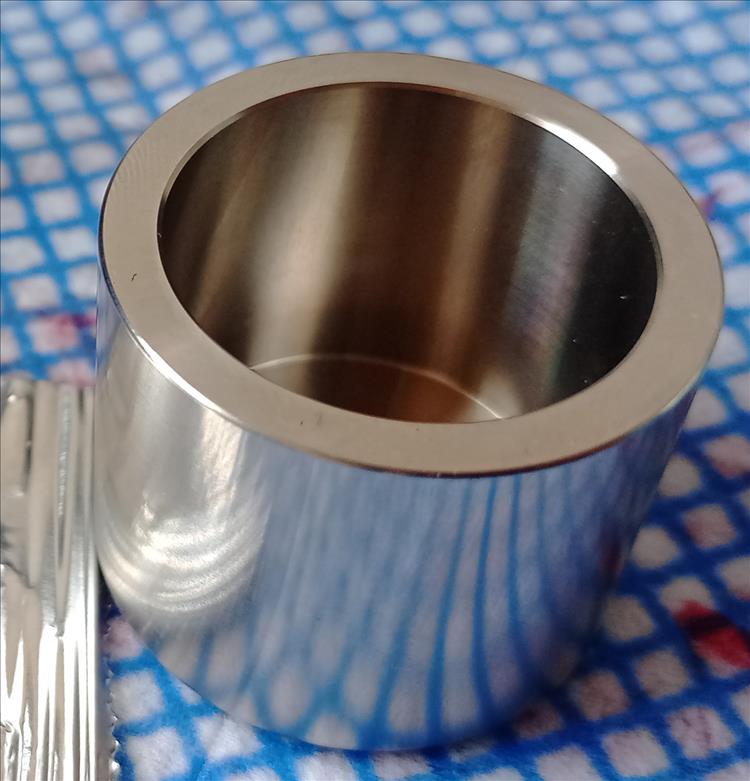
Ooooh shiny!
Motorcycle brakes are poop. Yes OK they do stop the bike very quickly these days so they are effective, but they're still poop. It's like they were designed to only be used on dry days during summer, not when it's raining and there's salt on the roads.
Car brakes are different. The primary difference is the piston(s) within the callipers have a protective boot to keep the salt and the dirt off the sliding area between the piston and the bore of the calliper. Of course being rubber this boot will fail but in the meantime the bit of the piston that matters, the sliding part, is kept clean.
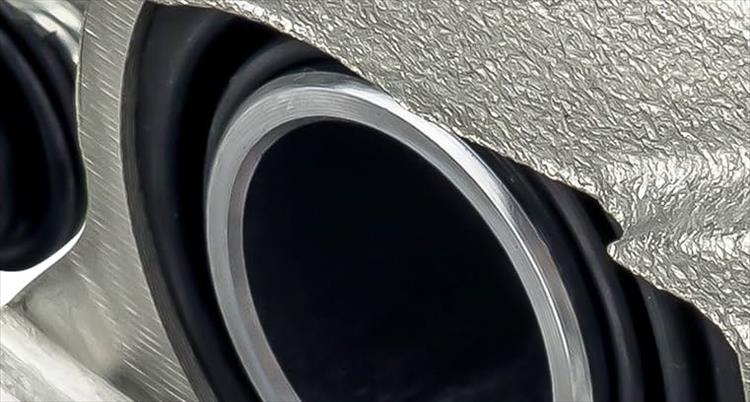
The rubbery bit keeps the slidy bits clean.
Motorcycles, not so. The sliding part is exposed to the elements where it collects brake dust and salt and grit. This, well this is just fine actually. As the pads wear more of the piston is exposed so the nasty gritty corrosive stuff is never forced into the sliding area. As long as this unpleasantness is cleaned from the piston BEFORE you push the piston into the bore because you're fitting new pads then - no problem.
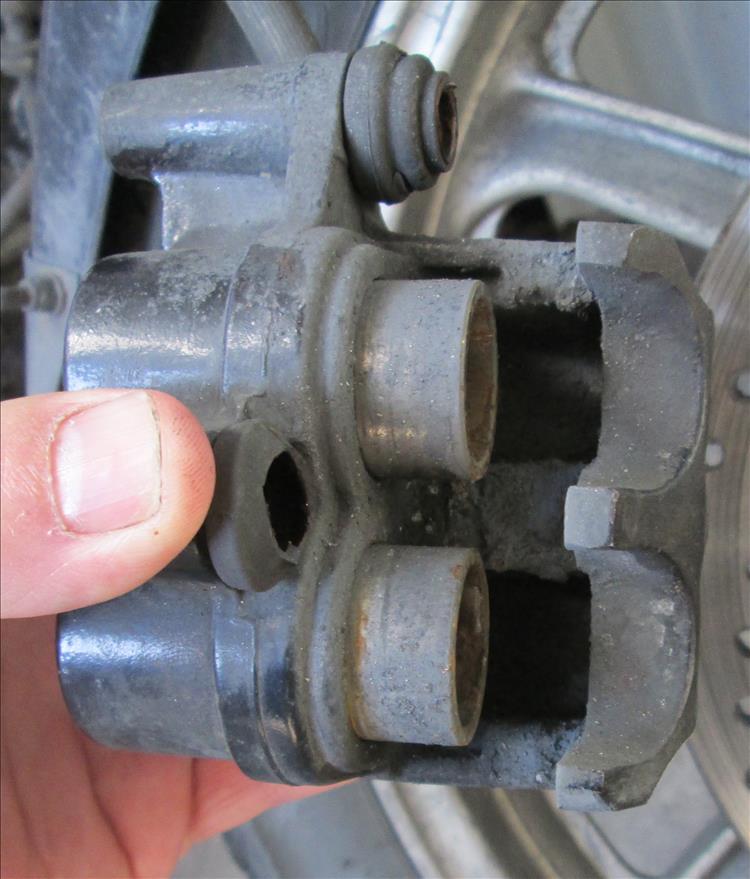
This is fine as the dirt is on the outside, for now.
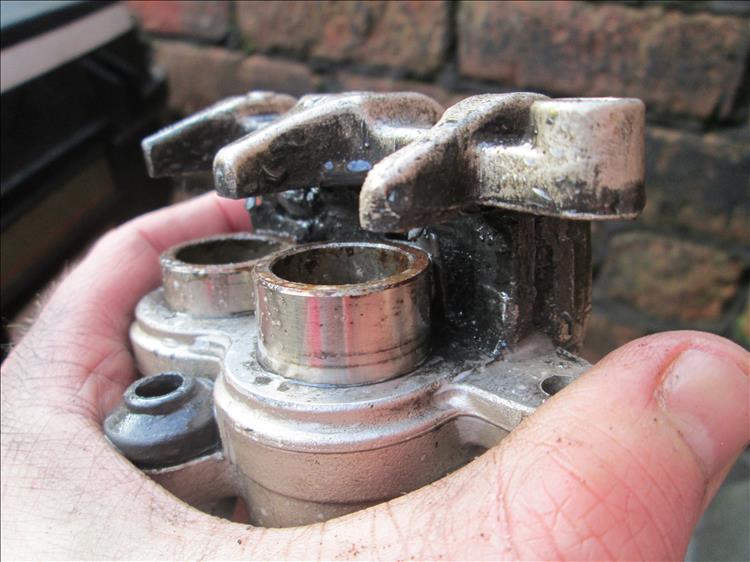
Just make sure the pistons are cleaned before pushing them back home.
Except a lot of manufacturers' pistons are capable of corroding. The corrosion of the piston causes damage to the sliding surface of the piston. When the piston is cleaned this can be seen. This damage on the sliding surface can damage the pistons seals and cause leaks. Leaking brakes is a bad thing.
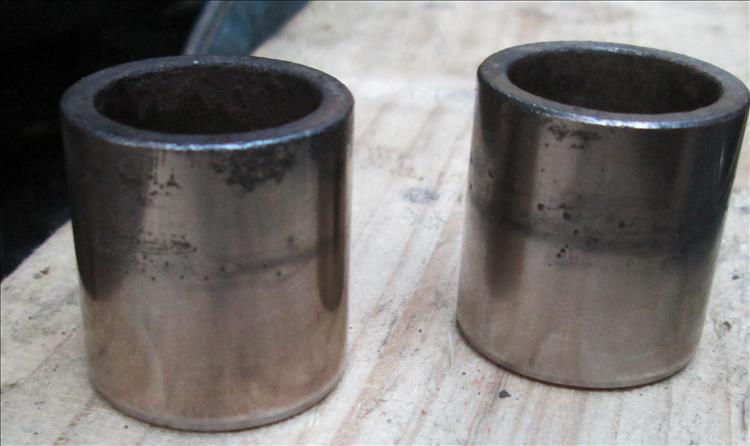
I've seen worse, but the pitting is sub-optimal.
Many moons since I owned a CLR125 City Fly with a Grimeca front brake. The pistons were some odd lightweight ceramic things and they were great! No corrosion just meant a quick wipe with a dab of petrol on an oily rag and the pistons looked as good as new. Otherwise with a rag-tag collection of Nissin, Brembo, Yamaha and no-name callipers over the years corrosion on pistons has been ubiquitous.
The front brake on the 500 is sticky. After all my ranting it won't be the pistons sticking it'll be the blasted sliders. The brake needs regular disassembly to clean the sliders, I've done it countless times with all my hydraulicly braked sliding calliper bikes over the years, it's a fact of motorcycle ownership. All except the Grimeca. Why? Because with poor tolerances between the sliding pins and the casting it rattled and shook any dirt out and kept working relentlessly.
I clean the sliding pins and as a matter of routine I clean the pistons too. They are now 5 years old with over 40,000 miles on them and they are starting to corrode. To be honest these ain't so bad. I wash them then rub off the crusty corrosion with 1200 wet-n-dry. They'll be just fine, get another few years outta them at least.
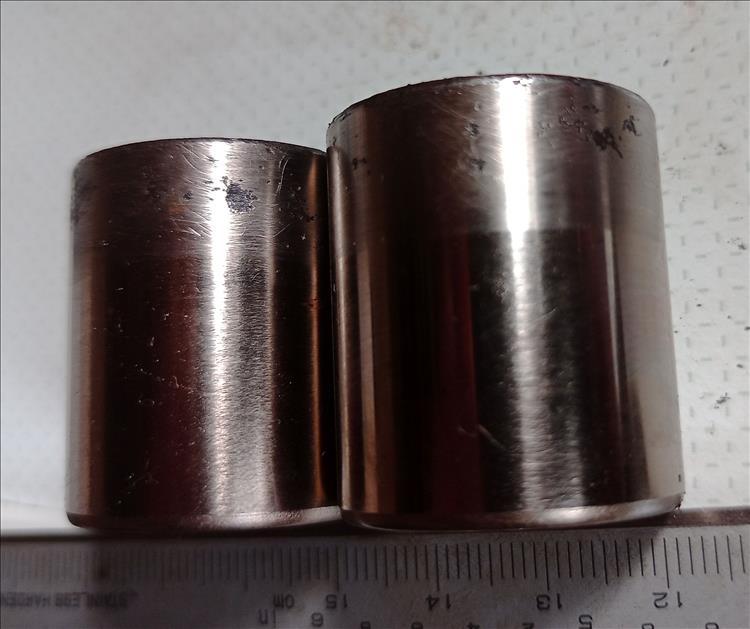
These are far from perfect but would be fine for a while longer.
I'm having a brain fart. Too much money obviously.
Wemoto have for eons had a selection of stainless steel replacement brake pistons for a fair range of models. I've always wondered if these are a good idea. Stainless steel ought not rust or otherwise corrode see, in which case cleaning them should return them to fully serviceable condition indefinitely. There's life left in my existing pistons but before I realise my mistake I've ordered the stainless from Wemoto. I'm not well. I've ordered one for the rear too.
A note on stainless steel. The very name stainless steel tells me it is steel that is stainless. And still I had a girlfriend once who's cooking stained stainless steel pans. By it's very name stainless steel is a shining (or not) example of false advertising. I'm told welding stainless is difficult. Not so, the same girlfriend could weld food to a stainless pan with nothing more than a regular gas stove.
Anyhow my pistons are here complete with new pistons seals and dust seals and little sachets of "red grease". Google tells me red grease is safe to use with piston seals. I remove the front brake, pop out the old pistons, clean, clean and clean again the whole calliper inside and out, dry the calliper with a little heat and a lot of time, fit the shiny new pistons and refit.
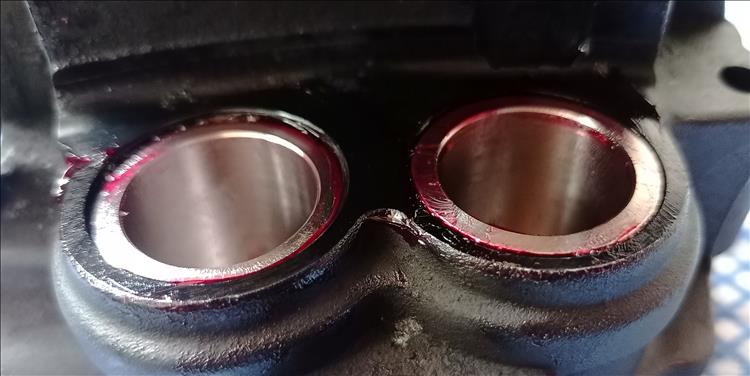
Oooooh lufferly lufferly lufferly.
Can you bleed ABS brakes without a fancy dancy computer to do magic with the ABS pump? It appears you can, it just takes a little longer. That's to be expected with a longer hydraulic line taking a route from the lever to the pump then the brake.
The brake is working fine. Of course it feels better but it will do after cleaning the sliders and fitting the new seals. The actual pistons won't make any difference to how the brakes work other than making cleaning easier. Only time will tell now how the pistons age. In theory they should last hundreds of years and millions of miles, let's see how that works in practice eh?
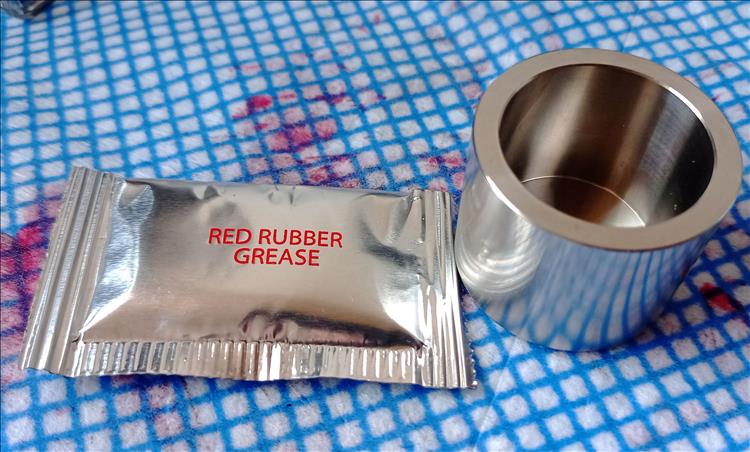
Let's see what it looks like in 5 years and 40,000 miles more.
Send Ren stuff to review - ren@bikesandtravels.com
Reader's Comments
Upt'North ¹ said :-
I concur, motorcycle disc brakes can be a right PITA. But your solution seems a good one.
I've just had a bleeding session on The B. To be honest they bled themselves. Easy Peasy. Although I haven't rode it since. What could go wrong? All the pistons and calipers seem fine but they will be cleaned when the permafrost lifts.
I will carry out intentional activation of the ABS as advised by some bright spark but I don't think it makes a lot of difference. Again, what could go wrong?
And on that note, we are being given a plus 60f day today for the first time in 8 months, so it might just get ridden. What is it, 3 down, 6 up?
Pffffffftttttt.
Good work fella.
Upt.
08/05/2024 09:48:41 UTC
Ian Soady¹ said :-
The Guzzi had anodised aluminium pistons if I remember correctly (Brembo brakes) which seemed to resist corrosion. As an aside, no idea why most Japanese bikes (at least the ones I'm familiar with) use that sliding caliper arrangement. Much better to use an opposed piston system although I admit it is fatter on the inside of the assembly and needs careful design.
08/05/2024 10:06:52 UTC
Ren - The Ed¹ said :-
Sliding callipers are easier to make therefore cheaper. With most riders only riding in the dry they are more than sufficient for warranty periods. Also the girth of the opposed pistons makes for more complex mounting etc as you said Ian.
I ought to check out the ABS working in the front, but that terrifies me Upt'. Remember that most ABS systems only work above about 6 to 8mph so you need to be at least moving enough to get a proper wobble going if not a slow speed drop. I certainly wouldn't be trying it out on a public road intentionally. Enjoy the nice weather, it won't last I'm sure.
08/05/2024 10:29:33 UTC
nab301 said :-
The original all alloy (caliper and pistons) opposed piston caliper on my '93 MZ had an external dust cover on the pistons..and was good for 25 yrs. I always use silicone grease on the external parts (slider pins etc) of sliding calipers , and it may prevent moisture ingress/ corrosion if smeared on the external parts of the piston. My own opinion is that internal caliper parts should only be lubricated by brake fluid. Attached is a photo from a '90 VFR 750 that I purchased as a project , the slider pins had been lubricated by a previous owner with copper grease, would this have caused some sort of galvanic corrosion? The brakes were fine after replacing the pins and heavily corroded pistons.
Nigel
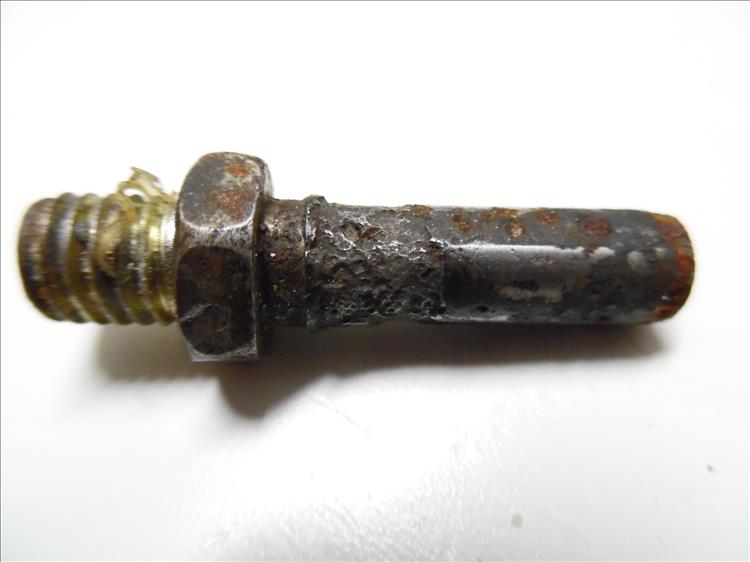 13/05/2024 12:51:01 UTC
13/05/2024 12:51:01 UTC
Ren - The Ed¹ said :-
Ewww nasty. I just caught a YouTube vid that tells me I need to avoid all lubricants that are dino oil based as it can mess up the rubber boots and seals. And I've used copperslip with a bad outcome though nowhere near as bad as your pictured slider pin nab301. They agree with you, silicone based lubes (no sniggering at the back) are the way to go. Any brand of silicone grease you'd suggest for those of us too lazy to think for ourselves?
13/05/2024 13:14:14 UTC
Ian Soady¹ said :-
The point is that mineral based oils or greases must NOT come into contact with the seals in brakes which are made of natural rubber (unless of course you have a Citroen DS - a real one - which uses a totally different system). Girling and others sell a red rubber grease which is OK for seals etc but Nigel's use of brake fluid (but which DOT??) is fine. Speaking of which I use DOT 5.1 which despite its name is really DOT 4+. DOT 5 was recommended for a while but I believe was hygroscopic and is no longer recommended. In any case you had to totally flush the system as DOT 4 and 5 are incompatible.
You can use ordinary lithium grease for those pins (and I do) as they're not in contact with the seals.
I loathe copaslip which people slather over everything in sight. It too is verboten for internal brake components. Its main (well only really) use is as an anti-seize compound for nuts & bolts etc but I personally don't even like it there.
13/05/2024 15:04:44 UTC
nab301 said :-
I use silicone grease on the sliders because they have rubber boots , and use brake fluid on the hydraulic seals when rebuilding ( supplied in a sachet with Brembo OE seal kits), that is, anything in the sealed hydraulic system which on all my applications is currently DOt4 ( I think all brake fluid except silicone based is hygroscopic which is why it has a service life?) . I always thought red rubber grease back in the day was supplied with wheel cylinder repair kits on drum braked cars and used inside the external dust cover to discourage moisture and lubricate push rods on the likes of slave cylinders..
The silicone grease in the link below is just what is available locally to me .
Nigel
https://www.bardahl.nl/en/product/73900-silicone-grease-en/...
13/05/2024 16:30:19 UTC
Upt'North ¹ said :-
Most manufacturers stipulate to wash the relevant brake components in brake fluid and not wipe dry before reassembly. As for the sliders, silicone grease would be their normal recommendation.
Upt.
14/05/2024 00:04:05 UTC
Name
Comment
Add a RELEVANT link (not required)
Upload an image (not required) -
Uploading...
Home
Repair And Restoration